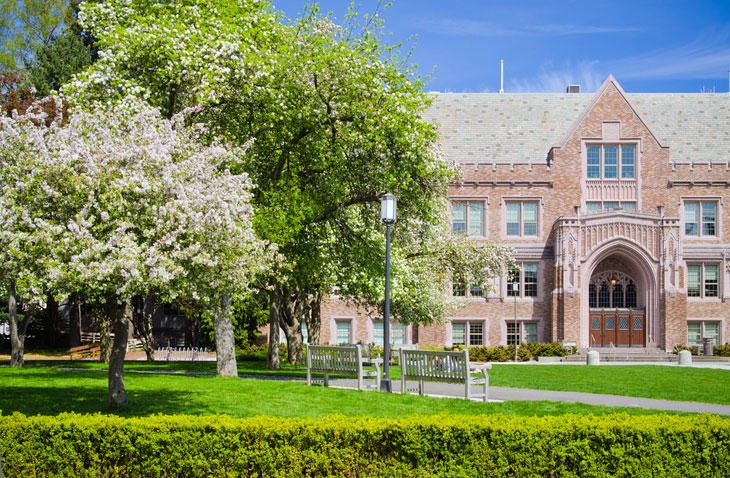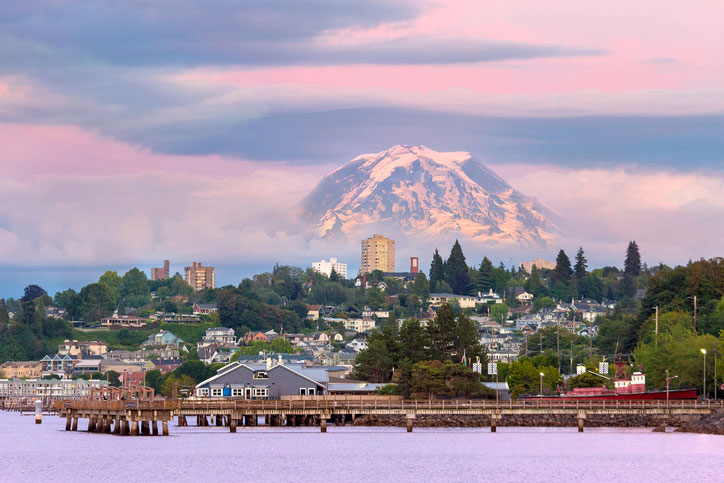Whether you’re a recent high school graduate, career changer, or working professional seeking advancement, this comprehensive guide provides everything you need to know about pursuing a BSW in Washington State. From detailed program comparisons and admission requirements to career outcomes and salary expectations, we’ve compiled the essential information to help you make an informed decision about your social work education. Below, you’ll find in-depth analysis of each accredited program, insights into Washington’s thriving social work job market, and practical guidance for navigating your path from undergraduate studies to professional practice.
All 7 Accredited BSW Programs in Washington
Washington State provides multiple pathways to earn your Bachelor of Social Work degree from institutions accredited by the Council on Social Work Education (CSWE). Each program prepares students for entry-level social work practice and eligibility for Advanced Standing MSW programs.
| University | Location | Format Options | Program Length | CSWE Accredited |
|---|---|---|---|---|
| University of Washington | Seattle | Campus | 4 years | Yes |
| Eastern Washington University | Cheney | Campus, Hybrid | 4 years | Yes |
| Seattle University | Seattle | Campus | 4 years | Yes |
| Heritage University | Toppenish | Campus | 4 years | Yes |
| Pacific Lutheran University | Tacoma | Campus | 4 years | Yes |
| Saint Martin’s University | Lacey | Campus | 4 years | Yes |
| Walla Walla University | College Place | Campus | 4 years | Yes |
Why Choose a BSW Degree?
Though not required to qualify for an MSW program, a Bachelor of Social Work offers significant advantages for students committed to the social work profession. The BSW provides comprehensive preparation for entry-level social work positions while establishing eligibility for accelerated graduate programs.
BSW graduates qualify for one-year Advanced Standing MSW programs, reducing graduate school by up to 50% and saving thousands in tuition costs.
The BSW curriculum introduces students to core social work competencies, including:
- Human behavior and the social environment
- Social welfare policy and services
- Research methods and evidence-based practice
- Cultural competence and diversity
- Field education (minimum 400 hours)

Online BSW Options
While most Washington BSW programs require on-campus attendance, students seeking online options can explore accredited online BSW programs offered by universities nationwide. Online programs offer:
- Flexible scheduling for working professionals
- Ability to complete coursework from anywhere
- Same CSWE accreditation standards as campus programs
- Local field placement arrangements
From city-based schools to rural options, campus models to hybrid programs, Washington offers educational opportunities for students with diverse needs and goals.
Featured Program: University of Washington BA in Social Welfare
The University of Washington’s Bachelor of Arts in Social Welfare stands as one of the Pacific Northwest’s premier undergraduate social work programs. This CSWE-accredited degree combines rigorous academic preparation with hands-on field experience to prepare graduates for professional practice.
Program Highlights
- Duration: 4 years full-time
- Field Education: 420+ hours of supervised practice
- Student-Faculty Ratio: 12:1
- Advanced Standing Eligibility: Yes

Core Curriculum Components
Cultural Diversity and Social Justice
This foundational course examines the impact of culture, ethnicity, race, socioeconomic status, gender, sexual orientation, and other factors on social work practice. Students develop cultural competence essential for working with diverse populations throughout Washington State’s communities.
Integrated Behavioral Health
Students learn evidence-based interventions for mental health, substance use, and healthcare settings. The curriculum emphasizes integrated care models increasingly used in Washington’s healthcare systems, preparing graduates for interdisciplinary collaboration.
Field Education
The program requires two field placements, totaling over 420 hours, which provide hands-on experience in agencies throughout the Puget Sound region. Students work directly with clients under supervision, applying the knowledge they have gained in the classroom to real-world situations.
Washington Social Workers: Essential Service During Crisis
Throughout recent public health emergencies and natural disasters, Washington’s social workers have demonstrated exceptional dedication to vulnerable populations. They’ve adapted services to meet evolving community needs, from providing telehealth counseling to coordinating emergency housing assistance.
Social workers continue to address critical needs, including mental health support, substance use treatment, child welfare services, and healthcare navigation across Washington’s diverse communities.
BSW graduates enter this vital profession prepared to serve individuals, families, and communities during both everyday challenges and extraordinary circumstances, making meaningful differences in people’s lives throughout the state.

Washington BSW Careers and Salaries (2024 Data)
BSW graduates in Washington enjoy strong employment prospects across multiple sector,s including healthcare, education, government, and nonprofit organizations. The state’s commitment to social services and progressive policies creates numerous opportunities for entry-level social workers.
Career Paths and Salary Data
According to 2024 Bureau of Labor Statistics data, Washington social workers earn competitive salaries that exceed national averages:
| Social Work Specialty | Median Annual Salary (WA) | Employment Numbers | 10-Year Growth Outlook |
|---|---|---|---|
| Child, Family, and School Social Workers | $58,250 | 10,570 | 11% |
| Healthcare Social Workers | $75,670 | 4,970 | 9% |
| Mental Health and Substance Abuse | $56,220 | 3,680 | 12% |
| All Other Social Workers | $96,550 | 870 | 9% |
Washington’s social work salaries reflect the state’s higher cost of living while offering competitive compensation compared to neighboring states. Metropolitan areas, such as Seattle-Tacoma, typically offer higher wages, while rural regions may provide loan forgiveness programs and other incentives.
Entry-Level Opportunities for BSW Graduates
BSW holders in Washington commonly find employment in:
- Child Welfare Services: Case management, family support, foster care coordination
- Healthcare Settings: Hospital discharge planning, patient advocacy, care coordination
- Mental Health Agencies: Crisis intervention, residential counseling, peer support
- School Systems: Student support services, attendance intervention, family liaison
- Community Organizations: Housing assistance, senior services, refugee resettlement
Frequently Asked Questions
Will a BSW make me eligible to become a licensed social worker in Washington?
No, Washington requires a master’s degree from a CSWE-accredited social work program for licensure. However, BSW graduates can work in various entry-level social service positions while gaining experience that prepares them for graduate school. Learn more about the requirements for social work licensure.
How will a BSW help me in my MSW program?
BSW graduates from CSWE-accredited programs qualify for Advanced Standing MSW programs, completing their master’s degree in just one year instead of two. This saves approximately $20,000-$ 40,000 in tuition and allows for earlier entry into licensed practice. Explore MSW programs in Washington to plan your educational pathway.
What makes Washington an excellent place to become a social worker?
Washington offers competitive salaries, progressive social policies, and diverse practice settings, ranging from urban Seattle to rural communities. The state’s commitment to social services, healthcare access, and education creates strong job security and advancement opportunities for social workers.
Can I complete field education requirements if I work full-time?
Most BSW programs require daytime field placements, making full-time employment challenging. However, some programs offer evening and weekend options, and Eastern Washington University provides a hybrid format that may accommodate working students. Discuss scheduling flexibility with individual programs.
What’s the difference between a BA and a BSW degree?
While both are bachelor’s degrees, the BSW is a professional degree designed explicitly for social work practice. BSW programs include specialized social work courses and supervised field education, which are required for eligibility to Advanced Standing in an MSW program. A BA in a related field, such as psychology or sociology, provides valuable knowledge but doesn’t qualify for accelerated MSW programs.
2023 US Bureau of Labor Statistics salary and employment figures for Child, Family, and School Social Workers, Healthcare Social Workers, Mental Health and Substance Abuse Social Workers, and Social Workers, All Other reflect national data, not school-specific information. Conditions in your area may vary. Data accessed August 2025.













